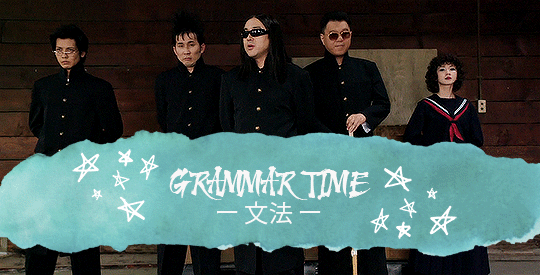#mangogrammar
Photo

Nothing consistent about this, but I thought I might start sharing some of the unfamiliar grammar points I come across -- if it helps anyone, cool! But I’m also hoping it’ll help cement the grammar a little more firmly into my own memory. There might be a few different uses of individual grammar points I note down, but the meanings I share are ones based on the context I find them in. I’m also perpetually learning, so I’ll be up front about anything I’m uncertain about and always welcome corrections. ♡
真相に追るたび、二人の大切な仲間たちが生命の危機にさらされていく。(x - synopsis from the 2023 film with Sakurai Sho and Hirose Suzu who play detectives Kazama Naoki and Mikami Anna respectively)
・たびに or たび
Meaning: each time〜; every time〜; whenever〜 | Bunpro ☆ Maggie
In this case, there is no に -- and most places show examples using the full adverbial form only, so I wasn’t sure if this interpretation was correct until I read Maggie Sensei’s post (thank you). She says に is sometimes dropped in formal writing and speech, but the meaning stays the same, which is: every time/whenever I do (A), (B) happens.
So in my example sentence, 真相に追るたび is saying whenever (Naoki and Anna) pursue the truth... 二人の大切な仲間たちが生命の危機にさらされていく happens. (Which I am interpreting as: (Whenever Anna and Naoki pursue the truth...) the lives of close friends are put at risk.)
京都を舞台に、イケメンだけど何をするにもワンテンポ早いハジメと、ワンテンポ遅くて周囲のペースから微妙にズレてしまうレイカが、消えた1日をめぐって不器用な恋を繰り広げる。(x)
・をめぐって
Meaning: concerning〜; in regard to〜; about〜 | JLPT Sensei ☆ Takoboto ☆ Imabi
Imabi provides some extra notes on the usage here -- it’s stiff language, and it can sometimes be used in a more literal sense (of passing through or around places), but it more often refers to ‘surrounding’ something that is often translated as “concerning〜”. “In a sense you are surrounding something in an interest and describing it.”
To brutishly translate “消えた1日をめぐって不器用な恋を繰り広げる,” I’ll say a clumsy or awkward romance develops in regards to or concerning a lost day... But to be a little liberal: Set in Kyoto, 1 Byou Saki no Kare tells the story of an awkward romance between the attractive, fast-paced Hajime and Reika, the little sloth that could, when (the memory of) an entire day goes missing.
It’s difficult for me to understand this in a ‘surrounding with interest’ concept, but...
・・・私、頑張っているよね ʅ(ツ)ʃ
映画制作にまつわる人々の奮闘、脚本のもとになった取材先での感動秘話などがフィクションと“湯ーモア”たっぷりに描かれる。(x)
・にまつわる
Meaning: related/relating to, associated with, connected to | Bunpro ☆ JLPT Sensei ☆ Nani Blog
The にまつわる grammar point is sandwiched between two nouns (so AにまつわるB), to say B is related to A. In this case, noun A = 映画制作 (film production) and noun B = 人々の奮闘 (everyone’s hard effort), so: 映画制作にまつわる人々の奮闘 = the hard work of everyone involved in the production of this film...
・もとになる
Meaning: become the basis for, become the foundation of (noun phrase) | Kanshudo
Ha ha, well, I don’t like this sentence! As much as I searched, I only found the one explanation with one example, so I did what I normally do: look it up on google or twitter for in-the-wild examples. It’s all good, I get it -- AもとになるB, so B is the foundation of A. But, I don’t understand what 湯ーモア means, I’m not sure how to best understand 取材先 in this context, and I’m confused on how to fit in the first part of the sentence for comprehension. So,
Depicting plenty of fiction and “hot water(??),” stories (like the ones shared?) at interviews became the basis of the script
is my gist! Which might be totally wrong! --Moving on!
#japanese langblr#studyblr#japanese grammar#たびに#たび#をめぐって#にまつわる#もとになる#grammartime!#grammar: gt#mangogrammar
5 notes
·
View notes